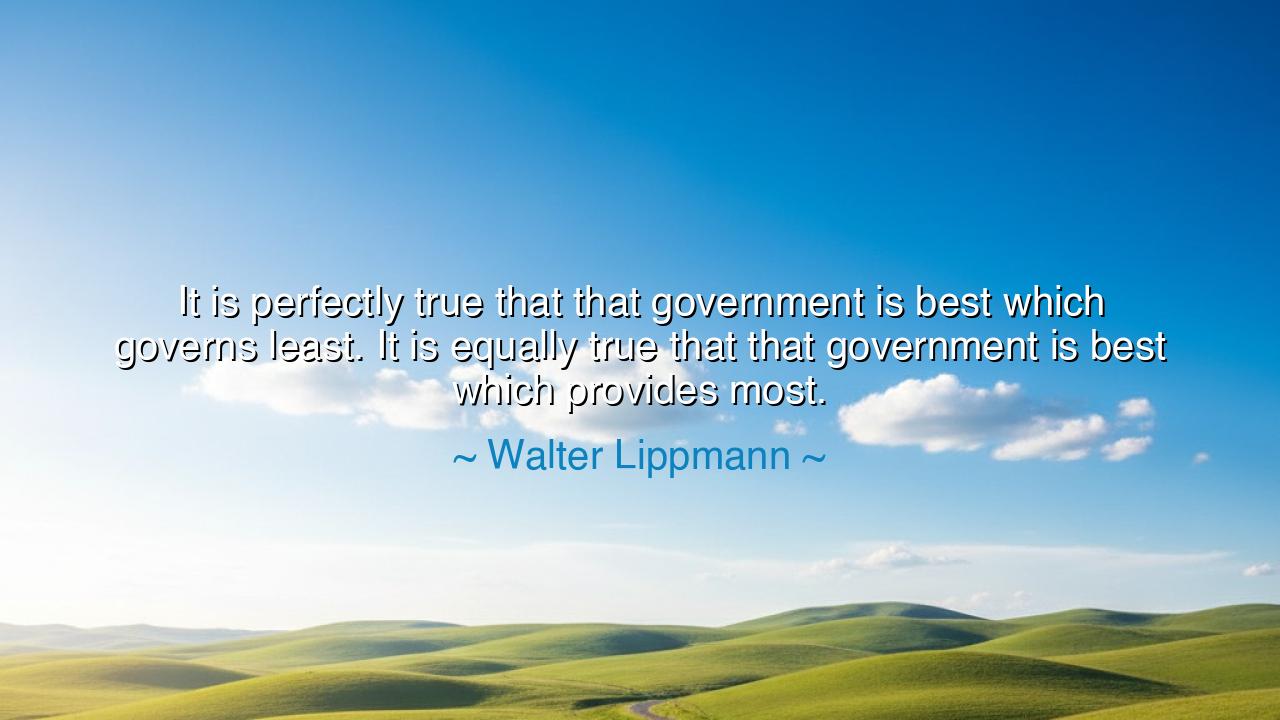
It is perfectly true that that government is best which governs
It is perfectly true that that government is best which governs least. It is equally true that that government is best which provides most.






The words of Walter Lippmann shine like twin torches, illuminating both the path of freedom and the path of responsibility. “That government is best which governs least,” he declares—and the heart of liberty stirs. But he adds, “That government is best which provides most,” and the heart of compassion awakens. In this paradox lies the eternal struggle of nations: how to balance the freedom of the individual with the duty of the state. Like the two wings of an eagle, both must move in harmony if a people are to rise. Too much governance and the spirit is crushed; too little provision and the weak perish in the shadows.
Lippmann spoke these words in the early storms of the twentieth century, when men had seen both the arrogance of empires and the despair of poverty. He lived in an age when freedom was prized, yet fear of chaos grew. His wisdom was not born in ease, but in the observation of the world’s wounds. He saw that liberty without care becomes neglect, and care without liberty becomes tyranny. Thus, his saying is not a contradiction, but a balance—a golden mean between chaos and control, between the power of the state and the dignity of the soul.
Let us look to history, for there we find the living mirror of his thought. In the days after the Great Depression, when the land of America lay broken and the hearts of her people weary, there arose a leader named Franklin D. Roosevelt. The people cried out for bread, for work, for hope. And though America had long cherished the creed of governing least, Roosevelt saw that to do nothing was to let despair rule. So he stretched forth the hand of government—not as a master, but as a steward—and built the New Deal. In doing so, he did not enslave his people, but empowered them to stand again. The hand that provides wisely does not weaken, but strengthens.
Yet beware, for there are nations that forgot this balance. The empires of old—Rome, Babylon, and Byzantium—grew proud in their wealth and power. They governed too greatly, and the people’s voice was drowned in decree. But when they fell, the streets filled with hunger and despair, and none came to aid the poor. Their downfall was not in the sword alone, but in the heart that no longer cared. A people can perish not only from tyranny, but from indifference. For when government neither governs wisely nor provides justly, both freedom and welfare decay together.
Thus, Lippmann’s words are a call to wisdom. True government does not rule by fear, nor coddle by excess. It is like a gardener tending a living tree: pruning when branches grow wild, watering when roots grow dry. To govern least is to trust the strength of the people; to provide most is to ensure that strength can flourish. The wise ruler does not make slaves of his citizens, but partners in the work of nationhood. And the wise citizen does not demand gifts from the state, but joins in the labor of justice and compassion.
Let us learn, then, that freedom and responsibility are one. A people who cry only for liberty may forget mercy, and a people who cry only for aid may forget dignity. The just path lies between these cries, where each man is both free and cared for, both sovereign and servant. This is the teaching not only of Lippmann, but of time itself, carved into the rise and fall of civilizations.
And to you who listen—take this teaching into your own life. Govern yourself wisely, that you may need little rule from others. But also provide—for your family, for your neighbor, for your world—so that your freedom becomes a blessing, not a shield for selfishness. For what is a nation, if not the sum of its people’s hearts? Let your heart be both strong and kind. In that balance lies the greatness of a people—and the eternal harmony of the governed and the free.






AAdministratorAdministrator
Welcome, honored guests. Please leave a comment, we will respond soon